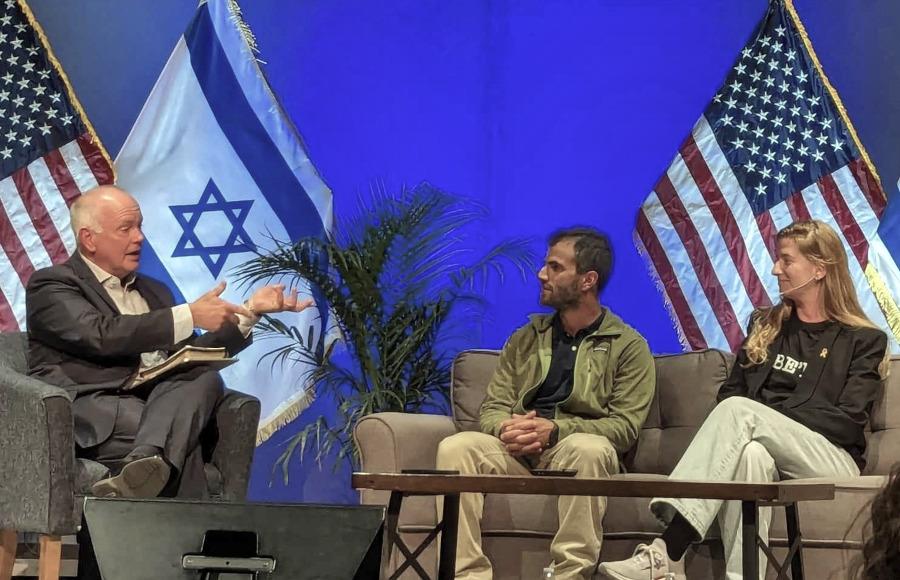What Does It Mean to Stand with Israel? (Part 4)
Image

Pastor Daniel Reehoff of DaySpring Church speaks with Yarden and Mika of Kibbutz Be’eri on June 7, in Pewaukee, Wis. Photo by Paul J. Scharf.
Read the series.
What does it mean to stand with Israel? My wife Lynnette and I were challenged to think about that question in a completely new way on Friday, June 7, when we heard a firsthand account of the terrorist massacre that Hamas unleashed last October 7.
Presenting were two survivors of Kibbutz Be’eri, an avocado farming community situated roughly two miles from Gaza. It was Hamas’ first target on that horrible morning. For the sake of caution, I will use only the first names of the speakers, Yarden and Mika.
The event, called “Faces of October 7th,” was held at DaySpring Church in Pewaukee, Wis., with roughly 350 people in attendance.
Like everyone in the close-knit kibbutz, Yarden and Mika were neighbors and friends. Now their bond has been forever changed—united by the horror and loss they have experienced.
Yarden, who is more fluent in English, gave most of the presentation. He was born on the kibbutz, where his grandparents moved in 1946—“before there was a state of Israel.”
‘We know that Gazans don’t like us, but we still flourished and felt safe,” he said. “It was a very great place to live. We had the best life. It’s green, there are flowers, people coming from all over the country. It was the best place in the world to grow up. It was almost a paradise.”
Yarden summarized: “We felt very safe.” He explained that residents never even locked the doors on their homes. “We never anticipated terrorists coming to our house.”
That changed on the morning of October 7, when between 500 and 600 terrorists—roughly half the number of the kibbutz’s population—flooded the area. A bulldozer broke through the fence which surrounded their homes, leading pickup trucks loaded with machine guns. There were six to eight terrorists for each house, Yarden said.
He explained that every house in the kibbutz had a safe room—but they don’t protect from things like fire. He said they are “for rockets, not for terrorists.”
“We were expecting the Israel Defense Forces to arrive very fast,” he said. “Where is the Army? Why is the Army not coming? There was no way to stop them.”
Yarden said that houses were burned with people inside of them, and that archaeologists had to be utilized to identify the remains.
Yarden was part of the kibbutz’s security team, but was away camping that morning, and was blocked by the IDF from returning home. His brother, also part of the team, was killed after seven hours of protecting the community. Mika’s mother was murdered, and her house was burned down also—one of more than 120 homes destroyed. Based on Yarden’s comments, 101 members of the kibbutz were killed, and another 31 were kidnapped. Eleven of those are still missing.
“Most of my friends lost their parents,” he said. “We lost so much on that day. We had, some days, 15 funerals a day. There was so much sadness.”
Residents were not allowed back in their homes for several weeks, as there was the possibility that terrorists could still be there in hiding. People tried to salvage as many valuables as possible from the rubble.
“We don’t want this to be the end of our home,” Yarden said. “We want the story of Be’eri to be the story of resilience. If we stop and walk away, we are asking for the next October 7. We are the front line. If we retreat from the front line, no one will be safe.”
Rebuilding the kibbutz is expected to take two years. Everyone at the event was invited to come and see it when it is finished.
The evening’s program included comments from several local and state officials, and prayers from area pastors. I had the privilege of leading in a closing prayer myself.
There was special music including “Hatikvah,” Israel’s National Anthem, and a message from host Pastor Daniel Reehoff.
I left the program with the following verses of Scripture embedded in my mind:
My soul has dwelt too long
With one who hates peace.
I am for peace;
But when I speak, they are for war. (Ps. 120:6-7)
NKJV - Source
Scripture taken from the New King James Version®. Copyright © 1982 by Thomas Nelson. Used by permission. All rights reserved.
Paul Scharf 2023 bio
Paul J. Scharf (M.A., M.Div., Faith Baptist Theological Seminary) is a church ministries representative for The Friends of Israel Gospel Ministry, based in Columbus, WI, and serving in the Midwest. For more information on his ministry, visit sermonaudio.com/pscharf or foi.org/scharf, or email pscharf@foi.org.
- 368 views
We are now into Part 4, and I still struggle to understand how to apply the Scriptural principle of "Standing with Israel" to today.
First, I am surprised that these two individuals spoke in a Christian church, as most rabbi's would be against this based on their view of the Talmud. But I do recognize that some are okay with this based on various circumstances.
Second, I guess to sum up this article, to Stand with Israel is to attend a speech or conference where an Israeli speaks and connect that speech to something found in the Old Testament. I am trying to understand the first point, "were challenged to think about that question in a completely new way". I am trying to understand what the completely new way was? Was it the perseverance and loss that these individuals and those in their enclave suffered on October 7th?


Discussion